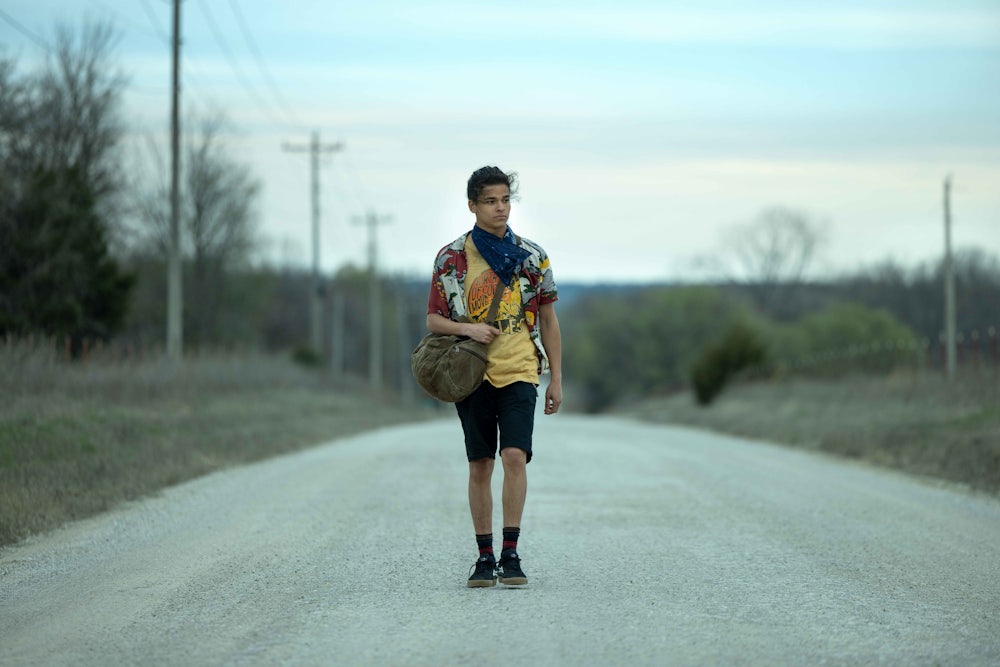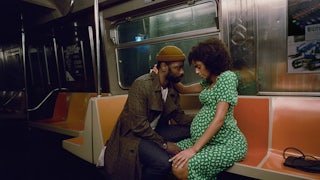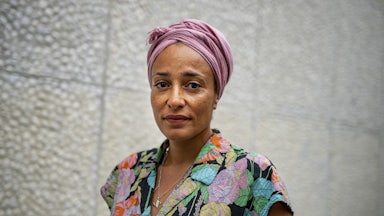In this depressing and precarious year for television, there have nonetheless been a few small, isolated miracles. Fresh off the disappointment of an expensive Lord of the Rings spin-off whose viewership took a nosedive after its ballyhooed premiere, this summer Amazon somehow managed to produce I’m a Virgo, Boots Riley’s Communist fantasy series about a 13-foot-tall Black teenager going to war against the Oakland police. In May, the screenwriters went on strike, at least in part over the creeping use of artificial intelligence, but, just two weeks before that, Peacock released Mrs. Davis, a brilliant, genuinely unhinged comedy series about a Catholic nun going to war against an omnipotent A.I. Netflix made the stingy move of kicking viewers off accounts they shared with parents and friends, while also producing the lavish, high-concept Beef, a dark road-rage dramedy about Millennial angst that features stand-up comedian Ali Wong masturbating with a gun in its first episode. How these strange and enlivening series ever got made in this particular media environment is a holy mystery.
Perhaps the most significant of this year’s miraculous occurrences is that FX’s Reservation Dogs—a series that has vacillated wildly between extreme silliness and grinding sorrow, featured an entirely Indigenous cast with no previously known stars of any kind, and is at least partially narrated by the ghost of a warrior named William Knife-man who died at the Battle of Little Big-Horn—is ending, triumphantly, on its own terms after three seasons.
The show premiered in 2021 partly thanks to the efforts of Taika Waititi—a buzzy auteur then at the height of his industry influence—who co-created the series with filmmaker Sterlin Harjo and then ceded creative control to Harjo and his (again, entirely Indigenous) writers’ room full of improv comedians and poets. Reservation Dogs is a risky proposition, relying neither on a big-name lead nor propulsive serial narrative: It is a show about the tragicomic exploits of all the people (and spirits) living on a reservation in Okern, Oklahoma, told from the point of view of four kids who are absolutely desperate to leave. Our heroes begin the series bored and depressed, and rather than invent ways to divert them, the show hones in on their boredom and depression, giving it gentle, granular attention.
These choices have resulted in a show that is unconventional but also wily and alive. Over three seasons, Reservation Dogs has told incredibly detail-rich stories about teen friendship, intergenerational trauma, and the strangling bureaucracy of health care on the reservation. It has introduced a woman with deer hooves for feet who drives a Ford truck and murders scuzzy men; a tall spirit who haunts dispossessed lands and avoids the surveillance cameras of white ranchers; and a man who harvests eggplants for visiting aliens. It takes place in youth homes, prisons, catfish diners, junkyards, the room where an old woman dies surrounded by the voices and presences of all her living family and all her ancestors before her. For three seasons, this show has been a fleeting and lonely oasis of hope in the midst of a media desert.
Reservation Dogs could easily have been a near-perfect hangout sitcom. Gifted with instant chemistry between the young actors in its core ensemble, we might have tagged along as the gang kicks back in their lawn chairs, gets into scrapes, and resets back home. But from almost its first moments, the show chose to defiantly resist the magnetic pull of that quartet, sending each actor off on (usually) solo voyages of self-discovery rather than staying in the safe orbit of the core four.
At the start of the series, we meet Bear (D’Pharoah Woon-A-Tai), along with his childhood friends Elora Danan (Kawennáhere Devery Jacobs), Willie Jack (Pauline Alexis), and Cheese (Lane Factor). These four teenagers laze around the neighborhood, pulling small-time heists and oddball capers, but also mourning the loss of their friend Daniel, who took his own life prior to the start of the show. Everything they do is inflected with whimsy and grief, and the magnitude of both increases the more we realize that their world is also defined by how surpassingly strange and epidemically grief-stricken it is. Everybody we meet has lost somebody, everybody we meet has seen a ghost, everybody we meet is having the weirdest, most ordinary day.
The “Rez Dogs,” as they come to call themselves, begin, then with dreams of escape, fleeing the traps—from dead-end jobs to death itself—that seem to have already ensnared all their elders. They spurn their parents and relatives, they break the law, they try, in so many ways, to simply get out. And, at the end of season 2, they finally pull it off, lighting out to California. But the start of this final season finds them stranded, with no car, no friends, and no place to stay in downtown L.A.
As they begin their long journey home, Bear decides—prompted by the aforementioned William Knife-man, who appears to Bear periodically at inopportune moments—that he has to make his way back alone. The next two episodes follow his odyssey through the American Southwest. In the first, he holes up with an exiled elder from his own community, now living in isolation and in anticipation of the return of the “star people” he believes he saw as a teenager. And the second puts him in the path of the legendary Deer Lady, a woman who escaped the alienation and anguish of a twentieth-century American Indian boarding school only to live an uncannily long life hunting down abusers like those who dehumanized her as a child. These stopovers are steps in Bear’s education, and they provide, in ways material and spiritual, a way home for him, but these characters also represent stories wholly their own. Almost everyone we meet in this show has such a story; almost no one will leave our view without a chance, first, to be heard.
Numerous characters throughout this final season, some we’ve only just met, repeat the same maxim: “Everything is connected.” And that’s a fine explanation for the presence of all the stargazers and spirits that wander across our screen, but Reservation Dogs is not The Wire. Everything might be connected, but that doesn’t mean that it will snap into place. This final season is in some sense about what the show’s sometimes frustrating, sometimes sublime structural choice—to be a show about a community, not a clique within it—really means. Your friends and your family are everything, but they can’t tell you who you are. Even if they could, you might not understand. Community is not about coherence, it’s about acknowledging and accepting even the connections you can’t see. Reservation Dogs asks the viewer to accept that too. In an era defined by exhausted and exhausting reboots and blunt and bloated televisual spectacles, it is a rare privilege to have a TV show ask that much of you.
Maybe the most shocked I’ve been by this show is when I realized what it was doing in its penultimate episode. Much of Reservation Dogs’ final season passed in the same diffuse way as its first two. There’s a brief reunion episode when Bear makes it back to Oklahoma, but, after that, there’s an episode about Cheese going camping, an episode about Bear’s mom and the ghost of Elora Danan’s mom hanging out together for a day, and there’s even an Indigenous Dazed and Confused–style episode about the younger days of several of the elders that float around the edges of the show. But by the eighth episode, the gang is all back together again for one last boondoggle. The pace and propulsiveness of the show changes. Our characters have been on their own long enough; out there finding themselves long enough. We feel an end, at least a thematic one, in sight.
But, true to form, last week’s episode—the last before this week’s finale—is yet another side quest, as Elora Danan goes off alone to find the father she never knew. Nearly the entirety of the episode is a two-hander between Jacobs—who also wrote the episode—and, if you can believe it, Ethan Hawke, who plays her absent father, Rick. There are no big arguments or shocking moments of catharsis, just a series of long, meandering chats that owe more to Hawke’s Before Sunrise series than to anything else this show has yet done. It’s not that these conversations between Elora and her father are trivial or beside the point. If there is resolution in this series, it lies at least partly in Elora accepting that she is not alone, despite the deaths of her mother and grandmother and the abandonment of her father. But the show’s willingness to spend these precious last moments bumming around off the reservation, literally and figuratively, is an act of almost surreal confidence. Every stop is a destination. Every nook and cranny of this teeming televisual world is its own ecosystem.
We talked a lot, over the past five, strike-darkened months, about what the creative promise of streaming was, and what that promise might become on the other side of the fraught negotiation between the Writers Guild of America and the Alliance of Motion Picture and Television Producers. (We’ll see!) Reservation Dogs was a great example of the kind of TV that a universe of forever archives and creative freedom seemed to support. Aesthetically, it follows in the lineage of post-Louie auteur dramedies like Better Things, Please Like Me, Atlanta, Ramy, and Somebody, Somewhere—shows that center voices from the industry’s margins but do so by reveling in deep specificity, using the inconspicuous form of sitcom to give terrific depth to characters who might otherwise not have appeared on screen at all. If the streaming era was about accumulating TV series, then a TV series like Reservation Dogs—that builds through narrative accumulation rather than forward momentum—ought to fit right in.
For all the creative virtues of that model of production, though, its financial model stank, and so we stand here with Bear and Elora Danan and Willie Jack and Cheese and all these ghosts, likely at the end of something that, for a time, was a sustaining force. It’s bittersweet to say farewell to Reservation Dogs, not only because it was a bright and generous and patient work of art, but because it seems so unlikely we’ll see something like it again soon. It’s a small miracle we ever did.






